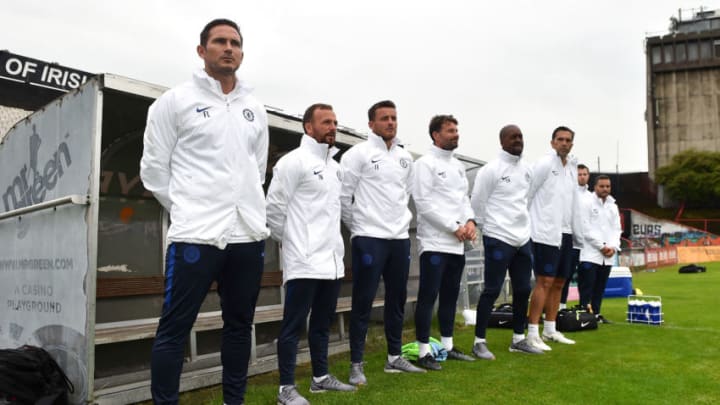Frank Lampard talked about what does and does not matter in his playing philosophy for Chelsea. You don’t need to be a genius like him to follow along.
There are two kinds of people in the Chelsea sphere: those who find Frank Lampard’s playing philosophy a refreshing statement of the obvious and those who find it an outrageously antedliuvian. Among the former are those who recognized the absolute control Jose Mourinho’s sides wielded over every opponent, using off-the-ball runs, pouncing counter-attacks from well-organized defences and crafty substitutions. They are the same who realize Antonio Conte was the master of circuit-based play, not because he hammered the same circuits well past the point of marginal gains but because he recognized the unique vulnerabilities of the Premier League to a three-man defence with wingbacks and the unique capabilities of players like Marcos Alonso, N’Golo Kante and Victor Moses; and because he used those circuits to progress the ball into the final third where he could unshackle the creativity of players like Eden Hazard, Pedro and Alonso. Those same Chelsea fans also appreciate the standard Carlo Ancelotti set for playing a 4-3-3 with a regista, and accepted no substitutes.
In the latter group are those who think a playing system can be xenotransplanted in toto from one league to another. They confuse the secondary and tertiary statistics of coaches like Pep Guardiola and Jurgen Klopp for the first principles of a successful football club. Wanting to shift the balance of sports-entertainment closer to Vince McMahon than Roman Abramovich, they mashed the keys on Twitter as furiously as they mashed their FIFA controllers until Chelsea replaced a serial winner with a serial runner-up as long as he promised fun for all and beautiful football. You know, morons.
Frank Lampard appeals directly to the first subset of fans. Asked about his playing philosophy, he said “my first call: how fit and how hard we can work without the ball, before talking about what we can do with the ball… Attacking football, defensive football, it’s all the same.”
This is the essence of the best managers Frank Lampard learned from, those who supplied the most important tactical lessons during his years at Chelsea and his time studying for his coaching badges.
Lampard dissociates control of the game from control of the ball, which is an important first step towards making Chelsea “difficult to play against .” The Blues learned last year that many times possessing the ball gives the team control of the ball, not the run of play. Against a quintessential Premier League team defending in a low, compact block, a “possession-based team” surrenders control, with nothing but a U-shaped pass map to show for their impotence.
Lampard also dispenses with the idea that a team’s philosophy is linked to their play in one direction or the other. “It’s all the same,” he says, because it is.
An attack can come out of a prolonged defensive posture. Many Chelsea highlights run about 15 seconds from recovering the ball in their defensive third to the ball hitting the back of the opponent’s net. Is a high press or a counter-press attacking or defensive? When N’Golo Kante tackles the ball at midfield and plays it out to an attacking midfielder at full stride 10 yards away, was that offence or defence? When did one end and the other begin?
Useless distinctions abound. Nearly as useless as terms like “beautiful football,” or notions that possession “imposes” your game plan on the other. Chelsea won a handful of their highest-possession games last season, but they were hardly in control. As always, the early game against Newcastle comes to mind. Eighty percent possession required a DeAndre Yedlin own goal and Eden Hazard penalty to secure three points.
Like Maurizio Sarri, Jurgen Klopp and Pep Guardiola have found their success through the quality of their players. Unlike Sarri, Klopp and Guardiola do not set out in chase of secondary metrics – those emerge from their philosophy as expressed through the quality of their players.
I can’t predict how much possession Chelsea will have in opener against Manchester United or the other opening games. Come March, we still might not be able to.
And I’m OK with that. It’s an aspect of the game where I won’t mind being neither right nor wrong because, like Frank Lampard, it’s wholly unimportant. We can discuss it afterwards, perhaps with the help of cool data viz and arrow-laden graphics, but those will reinforce the post facto nature of these analytics.
However Chelsea play will be in accordance with his philosophy, training and the quality of the squad. They will attack and defend, control the game without the ball and with it, shift their lines and their press as necessary.
Possession and labels will be the consequence, not the intent nor the means.
